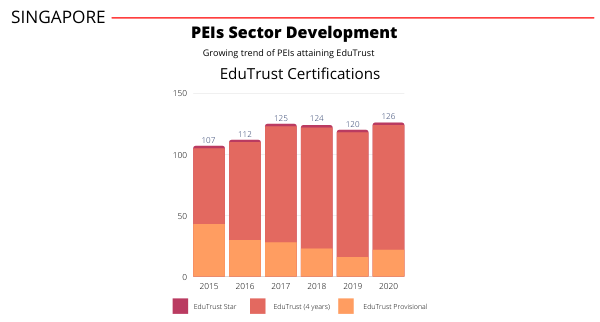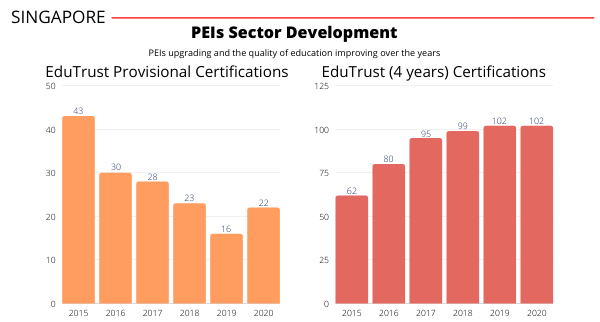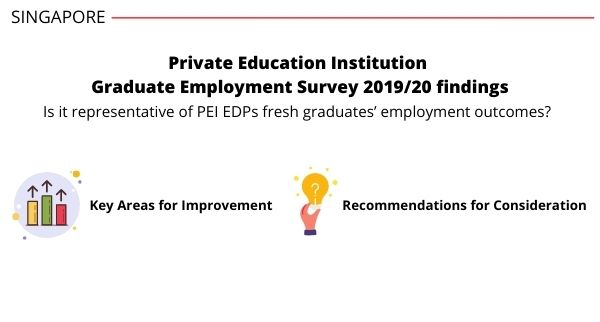Understanding the EduTrust Certification Scheme.
The EduTrust Certification Scheme is a quality assurance scheme administered by SkillsFuture Singapore (SSG) for Private Education Institutions (PEIs) in Singapore. This scheme aims to promote quality education in Singapore by ensuring that PEIs provide high-quality educational services and achieve positive student outcomes. As a key initiative to strengthen the private education industry in Singapore, the scheme serves to distinguish private education institutions that consistently uphold a high standard of quality in education services.
To qualify for and maintain EduTrust certification, institutions must meet a stringent set of EduTrust Certification Scheme criteria, covering areas such as academic processes, student support, fee protection, and continual improvement. For many private education institutions, attaining and maintaining the EduTrust certification is both an opportunity and a significant operational challenge.
Why Do PEIs Struggle with EduTrust?

While it is a prestigious certification, maintaining consistent compliance with EduTrust standards often presents considerable challenges for many Private Education Institutions (PEIs) in Singapore. Understanding these difficulties can help institutions better address the gaps and enhance their EduTrust journey.
1. Limitations of Internal QA and Compliance Teams
One major hurdle arises from reliance on internal Quality Assurance (QA) and compliance teams. While in-house personnel have intimate knowledge of institutional operations, they are not always equipped with the most current EduTrust certification scheme criteria. Frequent or sudden turnover exacerbates this issue, causing disruptions in compliance oversight and weakening institutional memory. Moreover, internal staff might lack the objectivity required for comprehensive self-assessments, potentially leading to blind spots during audits.
2. Rapidly Changing Regulations and Interpretations
EduTrust regulations and guidelines are dynamic, frequently evolving to reflect emerging educational priorities. For PEIs, particularly those holding a longer-term (e.g., four-year) EduTrust certification, staying updated on these regulatory shifts can be challenging. When institutions fail to keep abreast of such changes—like the introduction of Guidance Document 4.0 (GD 4.0)—they risk becoming non-compliant, creating vulnerabilities in future renewal processes.

3. Continuous Oversight and Comprehensive Compliance
EduTrust certification not a one-time achievement—it requires ongoing oversight and a sustained commitment to continual improvement. Institutions must consistently review and refine their institutional policies, processes, and systems to meet evolving regulatory expectations. Many PEIs often find themselves overwhelmed, focusing on immediate operational needs rather than long-term compliance requirements. Without continuous, dedicated monitoring, institutions may inadvertently let critical compliance areas lapse, placing their certification at risk.
Bridging the Compliance Gap for Private Education Institutions with Independent Expertise

To effectively navigate these complexities, an increasing number of PEIs have begun partnering with trusted QA and compliance firms. These partnerships strengthen quality assurance by upholding high educational standards and promoting continuous improvements. This offers the dual advantage of operational integration and objective oversight, enabling institutions to embed compliance within their daily operations seamlessly. Such external collaborations provide continuous, specialised support to ensure PEIs remain compliant with the evolving EduTrust standards, conduct impartial internal reviews, and foster proactive, sustained improvement.
Conclusion: How EduValue Can Provide Quality Assurance and Regulatory Confidence
In this landscape, EduValue emerges as a highly effective solution, offering independent yet operational support that directly collaborates with your institution’s internal teams. By continuously updating policies, overseeing processes, and ensuring comprehensive regulatory adherence, including the fee protection scheme, EduValue positions PEIs to anticipate and respond to regulatory shifts effectively. Through robust and proactive quality assurance, institutions partnering with EduValue can confidently navigate the complexities of EduTrust compliance. This ensures sustained certification success without diverting significant internal resources from their primary educational mission.





